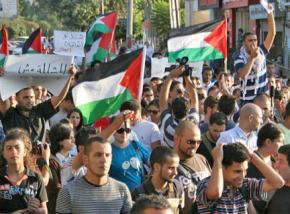An Intifada against the Palestinian Authority?
describes the role of the Palestinian Authority in suppressing the struggle for freedom and justice in the West Bank.
THOUGH THE mainstream media coverage of Israel and Palestine often speculates about a third Intifada (which means "shaking off" in Arabic), it's rarely pointed out that the next uprising will likely seek to shake off the Palestinian Authority (PA) before it turns its sights toward Israel again.
As the perception that the PA is a proxy for the Israeli government gains currency among Palestinians, popular resentment is spreading. "Here we have layers of colonialism and occupation--the Palestinian government is just another layer because it is an Israeli tool," lamented Ehab el-Shafie, a resident of Al-Am'ari refugee camp near Ramallah.
In January, PA police officers arrived at Al-Am'ari to dispel a small peaceful solidarity protest for prisoners in Israeli lockup. After a small scuffle between youth from the camp and the officers, live ammunition was fired at unarmed civilians, injuring three young men who were later transferred to a nearby hospital for treatment.
"The way they attacked the camp--surrounding all four entries, coming from behind stores and the UNRWA [United Nations Relief and Works Agency] school, blocking all exits--felt just like when the Israelis attack us, putting us in a collective torture chamber," recalled el-Shafie. Afterward, residents were forced to remove posters of prisoners for "aesthetic considerations," he added.

This incident is a microcosm for the present reality in the occupied West Bank: while the PA makes diplomatic waves in the mainstream media, it's quietly securing Israel's occupation in both principle and practice.
President Mahmoud Abbas' highly praised efforts to gain Palestinian statehood in the United Nations over the past two years weren't merely exercises in futility: the inability to even marginally pressure Israel in an international theater demonstrated the utter malignance of semi-sovereign self-governance under the occupation's heel.
In November 2012, the UN General Assembly voted for an independent Palestinian state in the 1967 territories--the West Bank, the Gaza Strip and East Jerusalem--but Israel has faced precisely zero consequences for declining to recognize the decision. Nearly nine months later, military occupation, settlement expansion and systematic dispossession are still collective punishments inflicted daily on millions of Palestinians.
UNDERSTANDABLY, MANY have rejected the two-state solution in its entirety. Refugees, who constitute over half the Palestinian population, feel particularly abandoned by the PA's official policy. "The Palestinian Authority believes in a Palestinian state that just includes the West Bank and the Gaza Strip," said el-Shafie. "We felt like they were telling us that, it's over, we have a new home and we have to forget our pasts in Jaffa, Lod and Haifa."
Personified by figures like President Mahmoud Abbas and former Prime Minister Salam Fayyad, massive development plans fueled by Western donor aid have also proved to be sources of deep contention.
"Huge hotels are built to service tourists who consume large amounts of water, while next door, refugee camps are struggling to provide enough water for the daily needs of their populations," said Najwa Darwish, director of Badil Resource Center for Residency and Refugee Rights.
It doesn't help that the government abandoned its democratic mandate in 2006, having not held an election since--or that the division of the PA-controlled West Bank and Hamas-led Gaza Strip persists despite much talk of reconciliation and national unity.
Meanwhile, Israeli security is outsourced to Abbas and company, who enforce the occupation on the tab of international donors. "This is the cheapest occupation in the world," said 64-year-old Mohammed Abu Ehab. "Israel doesn't have to pay for electricity, education, basic services--nothing! But they still control everything."
A number of the PA's deficiencies are weaved into the very fabric of the Oslo Accords, the infamous agreements between Israeli and Palestinian leaders, and others are products of the present policy of Abbas et al. But what is clear is that the government in its entirety is a barrier rather than a vehicle of liberation.
Clashes between Palestinians and Israeli forces have been consistent this year, punctuated by a number of sharp rises in coordinated protests across the West Bank. For instance, following the death of Arafat Jaradat in February, a detainee allegedly tortured to death by Israeli intelligence, cities, villages and refugee camps across the map were engulfed in demonstrations.
But mass dissent will mean little if it does not also scrap the illusion of self-determination seated in Ramallah, an anchor fastened to the ankle of all Palestinians. As journalist and activist Linah Alsaafin stated in a recent Jadaliyya interview, "It is increasingly clear that in order for another uprising to happen, the collaborative PA must be dealt an existential blow."
Much space has been dedicated to discussing the coming Intifada and what it will mean for Palestinians and Israelis. Without factoring in the PA's antithetical role and its imminent journey to the dustbin of history, this is much space wasted.


